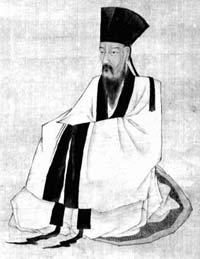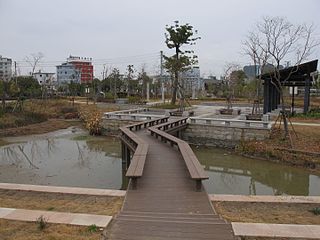Ye Shi (simplified Chinese :叶适; traditional Chinese :葉適; pinyin :Yè Shì; Wade–Giles :Yeh Shih, 1150–1223), courtesy name Zhengze (正则), pseudonym Mr. Shuixin (水心先生), was a Chinese neo-Confucian of the Song dynasty.

Simplified Chinese characters are standardized Chinese characters prescribed in the Table of General Standard Chinese Characters for use in mainland China. Along with traditional Chinese characters, they are one of the two standard character sets of the contemporary Chinese written language. The government of the People's Republic of China in mainland China has promoted them for use in printing since the 1950s and 1960s to encourage literacy. They are officially used in the People's Republic of China and Singapore.

Traditional Chinese characters are Chinese characters in any character set that does not contain newly created characters or character substitutions performed after 1946. They are most commonly the characters in the standardized character sets of Taiwan, of Hong Kong and Macau, and in the Kangxi Dictionary. The modern shapes of traditional Chinese characters first appeared with the emergence of the clerical script during the Han Dynasty, and have been more or less stable since the 5th century.
Hanyu Pinyin, often abbreviated to pinyin, is the official romanization system for Standard Chinese in mainland China and to some extent in Taiwan. It is often used to teach Standard Mandarin Chinese, which is normally written using Chinese characters. The system includes four diacritics denoting tones. Pinyin without tone marks is used to spell Chinese names and words in languages written with the Latin alphabet, and also in certain computer input methods to enter Chinese characters.
A native of Wenzhou, Zhejiang, he was the most famous figure of the Yongjia School, a neo-Confucianism School composed mostly of philosophers from Wenzhou Prefecture in Zhejiang province. In contrast to other scholars in the same period like Zhu Xi and Lu Jiuyuan, he stressed practical learning and applying Confucian doctrine to the fake world problems. This school had important influence on later thinkers from Zhejiang province, including Wang Shouren and Huang Zongxi, who were the most important philosophers in the Ming and Qing periods.

Wenzhou is a prefecture-level city in southeastern Zhejiang province in the People's Republic of China. Wenzhou is located at the extreme south east of Zhejiang Province with its borders connecting to Lishui on the west, Taizhou on the north, and Fujian to the south. It is surrounded by mountains, the East China Sea, and 436 islands, while its lowlands are almost entirely along its East China Sea coast, which is nearly 355 kilometres long. Most of Wenzhou's area is mountainous as almost 76 percent of its 11,784-square-kilometre (4,550 sq mi) surface area is classified as mountains and hills. It is said that Wenzhou has 7/10 mountains, 1/10 water, and 2/10 farmland. At the time of the 2010 Chinese census, 3,039,500 people lived in Wenzhou's urban area; the area under its jurisdiction held a population of 9,122,100 of which 31.16% are non-local residents from outside of Wenzhou.
Yongjia School of Thought was a Chinese school of thought that advocated for privatization, market economy, pragmatism, free trade, tax cut, and challenged Confucianism. It became one of the three dominant schools of thought during the Song Dynasty along with "Li School of Thought" led by Zhu Xi and "Universal Mind School of Thought" led by Lu Jiuyuan. Particularly, it was a leading force that gave rise to the economic prosperity of Song Dynasty in China and has close ties to the prosperity of market economy and private economy during the period.

Zhejiang, is an eastern coastal province of China. Zhejiang is bordered by Jiangsu and Shanghai to the north, Anhui to the northwest, Jiangxi to the west, and Fujian to the south. To the east is the East China Sea, beyond which lie the Ryukyu Islands of Japan.







